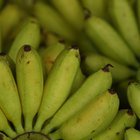
While overripe bananas are too sweet and mushy to eat on their own, they're useful ingredients in foods like banana bread, but there comes a time when your bananas are simply too rotten to use in any way. Their soft skins only do so much to protect them from dangerous pathogens and insects, so if you notice any of the signs that your bananas are too rotten to cook, play it safe and throw them away.
Risks of Overripening
Because bananas are soft inside and out, they are susceptible to certain threats that make them unusable. Fruit flies, for example, become more and more attracted to bananas as they become overripe. They don't just feed on them, either -- they lay their eggs in them. If you notice fruit flies around your bananas, you need to throw them away. Your bananas may also start to mold as they rot, so look for spores on the surface of the peel. Mold on a banana peel looks similar to the mold on bread, and if you see it, the bananas have to be thrown away. This is because they are too soft inside to fight off pathogens, which spread throughout the banana even if the mold is only visible on one part. Bruised and overripe bananas are particularly prone to infection and fungal growth.
Related Articles

How Long Does Banana Bread Stay Fresh?

How to Store Apples

Are Bananas Safe to Eat if the Skin Is ...

List of Tropical Fruits

Does Mango Turn Brown?

How to Prevent Bananas From Browning ...
How to Clean a Kiwi so the Skin Is Safe ...

Is Eating a Banana With Brown Spots Bad ...

How to Steam a Banana

Can You Peel and Refrigerate Bananas ...

Foods From Rainforest Plants

Getting Dirt Stains Out of Gray Leather ...

How to Remove Gum From Glasses

How to Julienne Jicama

Types of Greek Fruits & Vegetables

How to Cook Breaded Mushrooms in the ...

Which Nuts Are Alkaline Forming?

How Fast Does Cooked Spaghetti Squash ...

How to Clean Mold Off Leather Shoes
How to Toast Pistachios
References
Writer Bio
Tom Ryan is a freelance writer, editor and English tutor. He graduated from the University of Pittsburgh with a degree in English writing, and has also worked as an arts and entertainment reporter with "The Pitt News" and a public relations and advertising copywriter with the Carnegie Library of Pittsburgh.
Photo Credits
Jupiterimages/Creatas/Getty Images